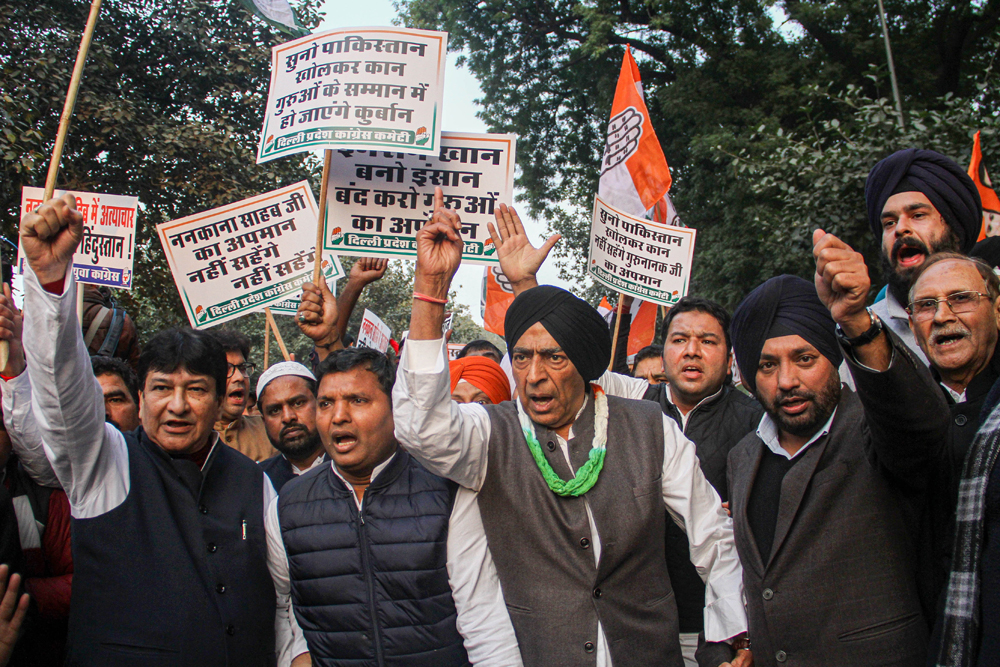The BJP and its ministers seized on Friday’s mob attack on Gurdwara Nankana Sahib in Pakistan to argue that the Citizenship (Amendment) Act was needed.
Union minister Hardeep Singh Puri went on Twitter on Saturday to question those opposed to the law, which fast-tracks citizenship to non-Muslim refugees from Pakistan, Bangladesh and Afghanistan.
“Murderous mob which laid siege to Sri Nankana Sahib has also threatened to change the name of this holiest of holy places to Ghulam-e-Mustafa. Persecution of minorities in Pakistan is for real. Do those opposed to CAA still need more proof?” Singh tweeted.
Singh also said the “vandalism, stone pelting & acts of desecration at the holiest of holy Sri Nankana Sahib Gurudwara yesterday should be an eye opener for those who refuse to recognize religious persecution of minorities in Pakistan & the rationale behind CAA”.
However, critics of the law are opposing it not because it offers to fast-track citizenship to the persecuted but because it leaves out people from one community. Even allies of the BJP have urged it to drop the names of specific religious communities and the countries, and allow the law to apply to all refugees fleeing persecution from any of the neighbouring countries.
Singh posted both his messages in Hindi and in Gurmukhi, a day ahead of the nationwide mass awareness campaign the BJP plans to launch on the amended act on Sunday.
A formal media conference by the BJP followed exclusively on the issue, with Lok Sabha MP Meenakshi Lekhi leading the charge.
The attack, she said, was equivalent to someone attacking the Kaaba — the building at the centre of Islam’s most important mosque, the Great Mosque of Mecca — or Jerusalem, as Guru Nanak was born in Nankana Sahib.
Ironically, the BJP directed at Pakistan the same argument that Indians opposed to the CAA have used while speaking up for Muslims in India — that they are born in India and chose to remain in the country despite having the option to migrate to Pakistan.
“The Pakistan government and society must know that Pakistani Sikhs are the off-spring of that soil and continue to have faith and duty towards that soil and, thus, did not migrate and chose to remain there,” Lekhi said.
By late on Friday night, Pakistan had gone into denial mode with the foreign office saying the problem at Nankana Sahib was because of a scuffle between two Muslim groups and not a communal issue as has been made out. “All insinuations to the contrary, particularly the claims of acts of ‘desecration and destruction’ and desecration of the holy place, are not only false but also mischievous,” the foreign office statement said.
The Pakistani media had, however, reported about the incident and posted videos of the prolonged siege of the gurdwara on Friday; one also showed footage of policemen throwing a ring of defence around the structure.
There is also a video recording of Pakistan Gurdwara Sikh Prabandhak Committee president Satwant Singh appealing to the government to book the two culprits — a father-son duo — under the country’s blasphemy law.
He further said the two were intent on disrupting relations between the communities and alleged a conspiracy to disturb communal harmony. “Without a conspiracy, such things cannot happen,” he said.
The BJP and the Congress demonstrated near the Pakistan high commission in the capital to protest the attack as also the trigger — the alleged forced conversion followed by the marriage of a Sikh woman to a Muslim man.
Former Congress president Rahul Gandhi described the attack on Nankana Sahib as reprehensible, saying it must be condemned unequivocally. “Bigotry is a dangerous, age old poison that knows no borders. Love + Mutual Respect + Understanding is its only known antidote,” he tweeted.
Bengal chief minister Mamata Banerjee said the violence at Gurdwara Nankana Sahib was unacceptable. “Humanity comes above all else,” she said.
BSP chief Mayawati urged the government to intervene to ensure that such incidents did not recur.










